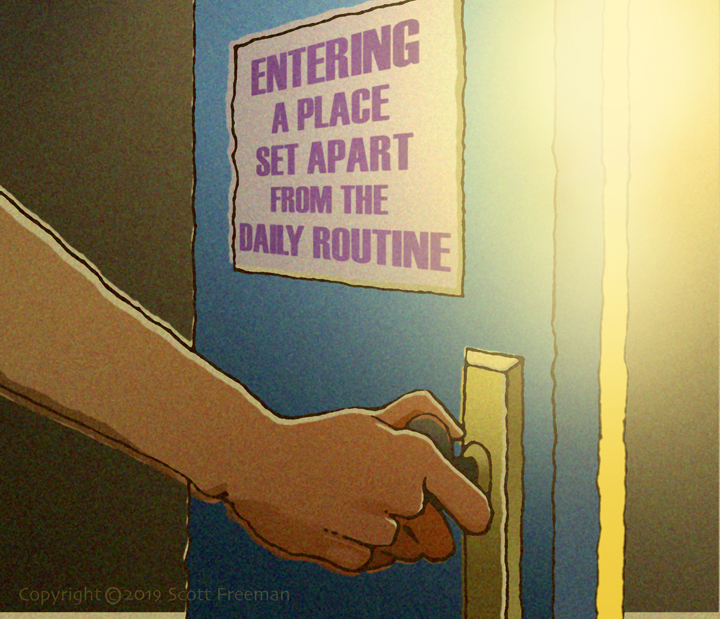
It’s been almost 2 decades since my wife and I moved our family to Colorado. Part of our vision as artists was to bring the arts into worship. Following are some thoughts on worship that we’ve been studying out and practicing for the past 20 years. I hope it inspires you! :
Perhaps enough time has passed now that I can say this without being labeled a heretic:
“Not everything we do is worship.”
There… I said it.
Over the past 20 years, I would say the idea of worship-as-a-lifestyle has become a fundamental assumption in the American evangelical church. In recent years I’ve heard the phrase less often, but my feeling is that’s because church leaders feel that the point has been made.
A decade and a half ago it seemed any discussion on worship referenced this idea. When Rick Warren’s best selling book, The Purpose Driven Life, came out in 2002, “worship is a lifestyle” was the punchline of his chapter on worship. Referencing Benedictine monk, Brother Lawrence, Warren helped cement the idea in the minds of American churchgoers.
In 2019 the idea is alive and well in evangelicalism. Here’s a sampling of results from a quick Google search:
“Worship isn’t simply an event or a place—it’s an orientation. It’s a way of life. It’s the result of our decision to exalt God above everything else.” (Tony Evans)
“Worship is so much more than the songs that we sing on Sunday morning. It is the life that we live the rest of the week.” (Daughterbydesign.wordpress.)
“Worship isn’t an event to attend and watch. It’s a lifestyle to be lived.” (unknown)
“I think worship is a lifestyle, first of all.” (Michael W. Smith)
“if the vital essence of that inner experience we call worship is a being satisfied in God or a cherishing Christ as gain above all things, this accounts for why Romans 12:1-2 portrays all of life as worship.” (John Piper, 1997)
“But worship is more than just an allotted time to sing songs of praise. We have been called to a lifestyle: living in a way that glorifies our heavenly Father, worshipping Him at all times and in many ways. Through this life of worship, God is welcome in all aspects of our lives.” (2017, YWAM Perth)
Harold Best, author and Dean of Wheaton College Conservatory of Music, says it as bluntly as anyone:
“There is no one in this world who is not, at this moment, at worship in one way or another, consciously or unconsciously, formally or informally, passively or passionately…for, you see, the desire to worship was created in us, not as an add-on, but as an intrinsic part of our very nature” (Harold M. Best, When is Worship Worship?).
I love these people
Before going further, I want to state a couple of things. I hate divisive speech. I love Rick Warren, John Piper, YWAM, Michael W. Smith’s worship albums in particular, and probably all the other people quoted above. Furthermore, I love the impulse that has moved them to make these statements. I fully agree with the point they are making.
Their point is this: As followers of Jesus, our whole heart and all of our lives should be devoted to God. For us there should be no division between sacred and secular; between Sunday morning and the rest of the week. They are talking about “abiding in Christ” and living full out for Him. I get it, and I fully agree. These are my people.
They are simply using the wrong word to make the point.
Nitpicky much?
In the Bible, the word “worship” actually means something specific. What if, in our zeal to inspire each other to fully devote our whole lives to God, we inadvertently discourage the worship He truly deserves? This is what I think is happening. This is not simply me being picky about semantics.
Test me on this. I contend that the Bible sets forth the meaning of worship in this way:
Worship is intentional, physical expression of one’s love for God.
We may feel many things toward God. Those things may be good things, but they are not necessarily worship; they are something else. We may petition God, we may lament, we may feel grateful, we may cry out for help, we may express joy, we may express anger, fear, doubt, or frustration toward God.
These things are all part of being relationally connected with God, but worship specifically expresses our awe and love for God through physical expression. It is something we do for, and intentionally toward, God, because He is worthy. Ideally, we do not worship “to get something out of it,” or “because it is good for us,” or “to get ourselves into a right frame of mind.” Worshiping God may indeed (or may not) do all of those things for us, but that is not the point. We are not the object in worship.
The physical expression piece
Why am I harping on physical expression? Because that is how the Bible describes worship. Because we are physical, as well as spiritual, beings. It is true that God has granted us spiritual rebirth but we are not, and never will be, disembodied spirits.
But can’t I worship by thinking worshipful thoughts toward God? Can’t I “bow down in my heart”? Isn’t that still a form of worship? *
I’m open to correction here, but if we want to take our instruction from the Bible, I just don’t see that idea in there. Thinking worshipful thoughts toward God leads to acts of worship, but it is the physical expression of the inward heart that is the act of worship. The thought or feeling is the beginning, but the physical act completes our worship.
Therefore you will see throughout the Judeo-Christian scriptures a multitude of physical expressions of worship directed toward God: singing, playing musical instruments, bowing, kneeling, lifting hands, falling down before, shouting, and dancing.
I must hasten to add here that the physical act alone amounts to nothing if the heart is not behind it. Worship is an expression of love; a demonstration of one’s heart.
Ask yourself, “Why resist employing your physical body in worship?”
*(Interesting to note: the only time I see the phrase “heart bowed down” in the Bible is when someone is in a state of grieving. It does not seem to be a phrase pertaining to worship).
Why does this matter?
This probably only matters to those who desire to be worshipers of God.
Years ago at a worship conference, I heard a speaker say that when he is eating Doritos after the service in the church foyer, he is worshiping God just as much as when he is singing on stage.
I disagree.
I would also take issue with Harold Best when he says:
“I wish there were a word in English which would at once mean both living and worshiping in an indivisible union, because that’s what God originally intended. This was how Jesus lived – thirty three years as a living sacrifice – no moment spent not worshiping…Thus it is quite easy to see how Adam and Eve were continually at worship in whatever they did – not once in seven days – but continuously: moment by moment, action by action, breath after breath…” (ibid).
But the scriptures don’t quite say this. Read it for yourself. There is no clear indication that Adam and Eve worshiped God at all. Indeed, this may have been part of what led to the fall of man – perhaps they regarded God too lightly, or took their relationship with Him for granted. I would argue that is apparently what happened.
I contend that these writers are conflating “worship” and “communion with God.”
We can indeed live moment by moment in communion – in relational unity – with God because of the salvific work of Jesus, I agree! But what if worship is actually something else? If we think we’re worshiping when we’re mowing the lawn, or changing the baby’s diaper, or eating Doritos while chatting in the church foyer, we may never see the need to set apart time for focused, intimate worship of God.
This would be the equivalent of a marriage wherein the lovers never actually set aside intimate time to express their love for one another. After all, they live moment by moment in a spousal relationship and in the knowledge that they love each other, right? So why set aside focused time to physically express their love?
In this sense worship is analogous to romance. Romance is not incidental or accidental. It involves 1) set apart time, 2) focused thought and attention, and 3) making one’s heart known through some physical expression.
The same can be said of worship.
We’re very busy. Could our belief that “everything we do is worship” conveniently be keeping us from actual worship?
In a similar vein, my pastor, Pat Sokoll, recently referred to his earthly father in a way that made this point beautifully. He observed that men in his father’s generation generally thought in terms of expressing their love for their families by being good providers; by faithfully working hard to serve their families. In their minds, their lifestyles showed their love for their families. (And they were right in thinking so). Yet many of these same men failed to express their love to their children by saying “I love you,” or by hugging them, or by kissing them, or by stopping work long enough to focus attention on their families.
Yes, serving is a crucial aspect of caring for one’s family, but it is not an excuse for neglecting to express intimate love interpersonally. It is the same with our relationship with God.
A brief word study
The original languages reiterate these two aspects of love. Throughout the Old Testament scriptures, two words are most frequently paired together when describing worship: “bow down” and “serve.”
Example: “You shall not bow down or serve them” (Ex 20:5).
This is the first of the 10 commandments; to have no other gods before YHWH. Over and over we see these words paired together to describe worship, either of YHWH Himself, or of false gods. These are the two sides of the worship coin.
The Hebrew word translated “bow down” (shachah) is often translated “worship.” In the New Testament, its Greek equivalent (proskuneo) literally means, “to kiss toward.” So both the Hebrew and Greek words literally describe physical expressions of adoration. Jesus uses “proskuneo” during His discourse with the Samaritan woman when he says the Father seeks worshipers who will worship Him in spirit and truth.
It is this word, proskuneo, that we usually have in mind when we speak of worship, worship music, worship services, and corporate worship.
By contrast, the Hebrew word translated “serve”, (abad), and its Greek equivalent, (latreuo), refer to service, including priestly temple service such as the ceremonial killing of animals. In Hebrews chapters 9 and 10, the descriptions of old covenant priestly temple service, (translated “worship”), use the word latreuo.
The verse most universally used to support the worship-as-a-lifestyle idea is Romans 12:1:“Therefore I urge you, brethren, by the mercies of God, to present your bodies a living and holy sacrifice, acceptable to God, which is your spiritual service of worship” (NAS).
Ironically, the word used here is not “proskuneo,” the word usually translated as “worship.” The word used is the word for service: “latreuo.” Paul is saying our temple service is no longer the sacrificing of animals, but is now the presenting of our whole selves to God. Our evangelical friends would be more correct to teach “service-as-a-lifestyle,” since that’s what Paul is urging here.
Arguably, (proskuneo) worship cannot be a lifestyle because it is by definition set apart from the daily stuff of life. Thus biblical worship encompasses both the daily grind, and also holy, undistracted intimacy; the quotidian and the transcendent.
Conclusion
It is not uncommon in modern church services to see congregants not actively participating in worship. Many churches encourage a “casual atmosphere” where people can sip a cup of coffee while they sit back and passively listen to the worship music. Is this inspirational? It certainly can be. Is it worship? I don’t think so.
Is this a legalistic approach to worship? To suggest that (proskuneo) worship cannot simply be thinking reverent thoughts toward God?
Well, can you say you’ve taken communion if you think about the body and blood of Jesus shed for us, but never actually partake of the physical elements?
Can you say you’ve been baptized if you consider yourself dead to your old way of living, but never actually go under the physical water?
Can you say you’ve expressed your affections to your spouse if you are never verbally or physically attentive and intimate?
I’m advocating giving God the worship that He deserves, both as a lifestyle but also, perhaps more fundamentally, in set apart, focused attention. I believe our intimate worship toward God will inspire and inform our lifestyle.
Part of the beauty of being human is our physicality. By the redemptive work of Jesus, God has given us His Spirit as well, making us “partakers of the divine nature” (2 Pet 1:3,4). Jesus said the Father is seeking worshippers who will worship Him (proskuneo) in Spirit and in truth. Let us be the kind of worshipers with whom the Father looks forward to connecting. When we gather together corporately in worship, may our corporate expression be one of conscious, undistracted focus, and love toward our Creator.
I welcome your thoughts and insights below.







 The kingdom of heaven may be compared to a man who sowed good seed in his field; but while men were sleeping, his enemy came and sowed weeds among the wheat, and went away. So when the plants came up and bore grain, then the weeds appeared also. And the servants of the householder came and said to him, “Sir, did you not sow good seed in your field? How then has it weeds?” He said to them, “An enemy has done this.” The servants said to him, “Then do you want us to go and gather them?” But he said, “No, lest in gathering the weeds you root up the wheat along with them. Let both grow together until the harvest; and at harvest time I will tell the reapers, ‘Gather the weeds first and bind them in bundles to be burned; but gather the wheat into my barn.’ “ Matthew 13:24-30
The kingdom of heaven may be compared to a man who sowed good seed in his field; but while men were sleeping, his enemy came and sowed weeds among the wheat, and went away. So when the plants came up and bore grain, then the weeds appeared also. And the servants of the householder came and said to him, “Sir, did you not sow good seed in your field? How then has it weeds?” He said to them, “An enemy has done this.” The servants said to him, “Then do you want us to go and gather them?” But he said, “No, lest in gathering the weeds you root up the wheat along with them. Let both grow together until the harvest; and at harvest time I will tell the reapers, ‘Gather the weeds first and bind them in bundles to be burned; but gather the wheat into my barn.’ “ Matthew 13:24-30